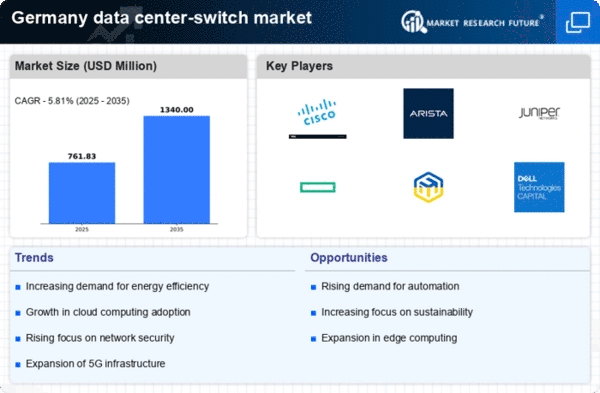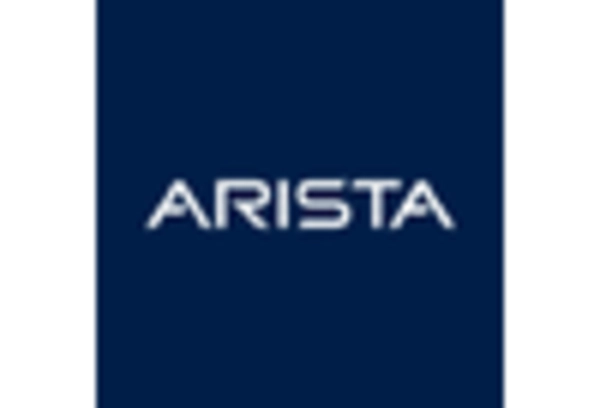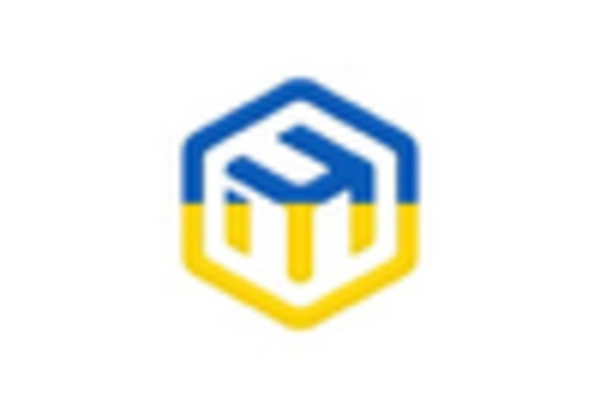The data center-switch market in Germany is characterized by a dynamic competitive landscape, driven by rapid technological advancements and increasing demand for efficient data management solutions. Key players such as Cisco Systems (US), Arista Networks (US), and Juniper Networks (US) are at the forefront, each adopting distinct strategies to enhance their market presence. Cisco Systems (US) focuses on innovation through its robust portfolio of software-defined networking solutions, while Arista Networks (US) emphasizes high-performance cloud networking, catering to the growing needs of hyperscale data centers. Juniper Networks (US), on the other hand, is leveraging its expertise in AI-driven automation to optimize network operations, thereby enhancing customer experience and operational efficiency. Collectively, these strategies contribute to a competitive environment that is increasingly centered around technological differentiation and customer-centric solutions.
In terms of business tactics, companies are increasingly localizing manufacturing and optimizing supply chains to enhance responsiveness to market demands. The competitive structure of the market appears moderately fragmented, with several players vying for market share. However, the influence of major companies remains substantial, as they set benchmarks for innovation and service quality, thereby shaping the overall market dynamics.
In October 2025, Cisco Systems (US) announced a strategic partnership with a leading cloud service provider to enhance its data center-switch offerings. This collaboration aims to integrate advanced AI capabilities into Cisco's networking solutions, potentially positioning the company to capture a larger share of the growing cloud infrastructure market. The strategic importance of this partnership lies in its potential to drive innovation and improve service delivery, aligning with the increasing demand for intelligent networking solutions.
In September 2025, Arista Networks (US) unveiled a new line of switches designed specifically for edge computing applications. This launch reflects the company's commitment to addressing the evolving needs of data centers that require low-latency and high-bandwidth solutions. The introduction of these products is likely to strengthen Arista's competitive position, as it aligns with the broader industry trend towards edge computing and distributed architectures.
In August 2025, Juniper Networks (US) expanded its AI-driven network management platform, introducing features that enhance predictive analytics and automated troubleshooting. This development underscores Juniper's focus on leveraging AI to improve operational efficiency and reduce downtime for data center operators. The strategic significance of this enhancement is profound, as it positions Juniper as a leader in the integration of AI within networking solutions, catering to the increasing demand for intelligent infrastructure.
As of November 2025, current trends in the data center-switch market are heavily influenced by digitalization, sustainability initiatives, and the integration of AI technologies. Strategic alliances among key players are shaping the competitive landscape, fostering innovation and collaboration. Looking ahead, it appears that competitive differentiation will increasingly pivot from price-based strategies to a focus on innovation, technological advancements, and supply chain reliability. This shift suggests that companies that prioritize these elements may gain a competitive edge in an evolving market.
















